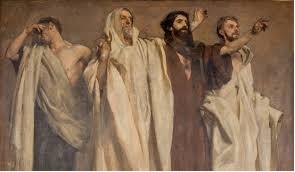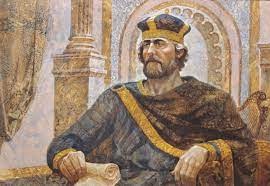Al – ¿Cómo escaparemos nosotros, teniendo en poco una salvación tan grande? La primera advertencia 2: 1-4
¿Cómo escaparemos nosotros, teniendo en poco una salvación tan grande?
La Primera Advertencia – 2: 1-4
El Peligro de la negligencia: judíos convencidos intelectualmente
¿Cómo escaparemos nosotros, teniendo en poco una salvación tan grande? ESCUDRIÑAR: ¿Qué hizo el escritor a los Hebreos en el medio de la discusión sobre los ángeles? ¿Para quién es esta advertencia? En última instancia, ¿Cómo las personas terminan en el infierno? ¿A quién está en realidad rechazando una persona cuando rechaza a Yeshua el Mesías? ¿Eligen deliberadamente ir allí o van a la deriva hacia el infierno? ¿Cuáles son las dos palabras griegas claves en 2:1? Defínalas a ambas y explique su significado. Explique cómo los ángeles fueron fundamentales para llevar la Torá a Israel. ¿Cuáles eran los dones del Espíritu a los que se hace referencia en 2:4? ¿Cuál fue su propósito especial?
REFLEXIONAR: ¿De qué maneras usted, o las personas que ha observado, descuidan su salvación? ¿Por qué es difícil apreciar y prestar atención a la Palabra de Dios como deberíamos? ¿Conoce a alguien que crea que Jesús es el Hijo de Dios que ha venido al mundo para salvar a los pecadores del infierno, pero que no ha cruzado la línea del conocimiento a la fe? ¿Está usted orando por ellos? ¿Los ha invitado a su lugar de adoración? ¿Los ha desafiado a dar el paso extra?
La mejor manera de reforzar su progreso en el cumplimiento de los propósitos de Dios en su vida es llevar un diario espiritual. Escriba las percepciones y las lecciones de vida que YHVH le enseña sobre usted, sobre la vida, las relaciones y todo lo demás. Registre todos estos de modo que pueda revisarlos y recordarlos. La razón por la que debemos prestar mucha atención a estas lecciones de vida es que nos olvidamos de ellas. Revisar su diario espiritual regularmente puede evitarle mucho dolor y angustia innecesaria. Nosotros recordamos lo que registramos.41
Vivimos en una época en la que la verdad no parece contar mucho. El clima intelectual se resume en un dicho popular como: “mi energía pasó por encima de tu dogma”. En otras palabras, “no se obsesione con cuestiones de doctrina o verdad, sentirse bien es todo lo que realmente importa”. Esto puede parecer inclusivo, tolerante y atractivo, pero está muy lejos de la actitud de los escritores bíblicos, para quienes tal actitud es una receta para el desastre.42
En Hebreos 13:22 se hace referencia a toda la carta como un mensaje de exhortación. Por tanto, esto requiere una respuesta. Entonces, mientras su enseñanza sobre la superioridad de Cristo sobre los ángeles calienta el corazón del escritor, inserta una conmovedora invitación. Y como todas las buenas invitaciones, incluye tanto una exhortación como una advertencia: qué hacer y qué sucede si usted no lo hace.
Los primeros versículos de Hebreos 2 contienen el primero de cinco pasajes de advertencia espaciadas a lo largo del libro, a menudo como aquí, en el medio de una enseñanza en una de las superioridades del Mesías (haga clic en el enlace y vea las advertencias en Ag –La audiencia del libro de Hebreos). Es como si el autor sólo pudiera llegar hasta cierto punto sin detenerse a hacer una apelación, ahora ¿qué va a hacer usted acerca de esto?” Una persona puede saber toda la verdad que hay que saber acerca de Jesucristo, pero si no se cruza la línea del conocimiento a la fe, se va a terminar en el infierno por toda la eternidad.43
 ¿Cómo escaparemos nosotros, teniendo en poco una salvación tan grande?, la cual, comenzando a ser proclamada por el Señor, nos fue confirmada por los que lo oyeron a Él (2:3) ¿A quién va dirigida esta advertencia? No puede ser para los creyentes. Nosotros nunca podemos estar en peligro de ignorar nuestra salvación – en el sentido de no recibirla – ya que la tenemos y no se puede perder (vea el comentario sobre La vida de Cristo Ms – La Seguridad Eterna del Creyente). Nosotros podemos descuidar el crecimiento y discipulado espiritual, pero no podemos descuidar la salvación. La advertencia tampoco puede ser para aquellos que nunca han escuchado el evangelio, porque no pueden ignorar algo que ni siquiera saben que existe. Así que la advertencia debe estar dirigida a aquellos judíos incrédulos, que estaban intelectualmente convencidos de la Buena Nueva, pero que fallaron al no recibirla.
¿Cómo escaparemos nosotros, teniendo en poco una salvación tan grande?, la cual, comenzando a ser proclamada por el Señor, nos fue confirmada por los que lo oyeron a Él (2:3) ¿A quién va dirigida esta advertencia? No puede ser para los creyentes. Nosotros nunca podemos estar en peligro de ignorar nuestra salvación – en el sentido de no recibirla – ya que la tenemos y no se puede perder (vea el comentario sobre La vida de Cristo Ms – La Seguridad Eterna del Creyente). Nosotros podemos descuidar el crecimiento y discipulado espiritual, pero no podemos descuidar la salvación. La advertencia tampoco puede ser para aquellos que nunca han escuchado el evangelio, porque no pueden ignorar algo que ni siquiera saben que existe. Así que la advertencia debe estar dirigida a aquellos judíos incrédulos, que estaban intelectualmente convencidos de la Buena Nueva, pero que fallaron al no recibirla.
Pero si la advertencia es para los incrédulos, ¿por qué el autor habla de nosotros? ¿Él se incluye a sí mismo entre los intelectualmente convencidos, pero no comprometidos? ¿Está diciendo el autor que él mismo no es un creyente? No. El “nosotros” significa que se incluye a sí mismo entre los judíos que habían oído el mensaje del evangelio. Su disposición a identificarse con esta congregación mesiánica no quiere decir que él estaba en el mismo barco espiritual donde ellos estaban. Habia cizaña entre el trigo (vea el comentario sobre La vida de Cristo Ev – La parábola del trigo y la cizaña). Es como si el escritor estuviera diciendo a los intelectualmente convencidos, “Todos nosotros que hemos escuchado el Evangelio debiéramos aceptarlo.” El mensaje subyacente es realmente, rechazar a Yeshua el Mesías es rechazar a Dios.44
Nosotros estamos dando tres razones para ser salvos. El carácter del Mesías: Si Cristo es simplemente otro ángel, es poca razón para tomar Su Evangelio en serio. Pero, porque Él es hecho tanto superior a los ángeles, por cuanto ha heredado un nombre más excelente que ellos (1:4), debemos dar más solícita atención a las cosas que fueron oídas (2:1a). La palabra griega para prestar atención, proseco o proséjo, es un término náutico. Que se utiliza para indicar que se mantiene un rumbo o se asegura el ancla de un barco. Hay un peligro, el escritor sostiene, pero también hay un remedio. Para evitar la deriva fuera de curso usted debe mantearse en el Evangelio, que es el timón del barco. Para evitar ir a la deriva con la corriente, eche usted el ancla de la Palabra de Dios en el mar del caos y la ética situacional.45
El alejamiento ocurre por sí solo sin mucho esfuerzo de nuestra parte, pero mantener el rumbo requiere un esfuerzo real. Nosotros debemos dar más solícita atención a las cosas que fueron oídas, no sea que las dejemos escurrir (2:1b) (escurrir o deslizar del griego: parareo o pararruéo, una palabra que se utiliza solamente aquí en el Nuevo Pacto). Este es otro término náutico que describe a un barco que ha navegado fuera de curso, o un barco en el puerto al que se le han deslizado sus amarres. En otros contextos se utiliza para describir algo que se desliza de nuestras mentes. Una de las principales ideas aquí es que está escurriendo, siendo algo que sucede en gran parte desapercibido. Mientras que está sucediendo los cambios son imperceptibles; sólo más tarde muestran sus consecuencias.46 La mayoría de la gente no se lanza de cabeza e intencionadamente al infierno, se desliza hacia él. La Palabra de Dios, sin embargo, nunca se escurre. El puerto de la salvación es Jesucristo, y Él no cambia. La salvación siempre está disponible hasta el momento cuando alguien escurre más allá del puerto de la salvación. ¿Cuántas personas han estado tan cerca solo para alejarse? Deslizarse es tan silencioso y fácil que todo lo que tiene que hacer es no hacer nada.
Al momento en que Hebreos fue escrito innumerables judíos habían oído el Evangelio, muchos directamente desde un apóstol. Sin duda, muchos estaban favorablemente impresionados con el mensaje, incluso intrigados por este mensaje. Ellos pensaron en esto, pero la mayoría lo rechazó. La advertencia de Yeshua: Poned vosotros estas palabras en vuestros oídos, porque el Hijo del Hombre está a punto de ser entregado en mano de los hombres (Lucas 9:44), puede aplicarse a la totalidad del Evangelio. Este debe estar dentro de nosotros y hacer un cambio en nuestras vidas. Que no es simplemente lo mismo que escucharlo. Eso es solamente el principio, se nos recuerda: Hijo mío, no se aparten estas cosas de tus ojos, Guarda la prudencia y el discernimiento, Y serán vida a tu alma, Y gracia a tu garganta. Entonces andarás con seguridad en tu camino, Y tu pie no tropezará (Proverbios 4:21-23). Cuando usted oye la Palabra de Dios, la hace suya.47 No la deje pasar a la deriva, pues tiene consecuencias eternas. En consecuencia, a los judíos incrédulos en el medio de la perseguida comunidad mesiánica se les insta a actuar y a pasar la línea del mero conocimiento – a la fe.
La certeza del juicio: A continuación, el Espíritu de Dios señala la razón por la que los lectores deben prestar atención al carácter del Mesías. Porque si la palabra hablada por medio de ángeles fue firme, y toda transgresión y desobediencia recibió justa retribución (2:2). En ninguna parte en el TaNaJ hay una clara declaración de que Moisés recibió la Torá a través de los ángeles. Hay, sin embargo, dos pasajes en el TaNaJ que insinúan esa posibilidad (Deuteronomio 33:2 y Salmo 68:17). Incluso aunque estos pasajes claramente no indican esto, esta enseñanza era una parte de la tradición rabínica. Ahora y entonces el Brit Hadashah confirma una enseñanza rabínica, y este es uno de esos casos (también vea Hechos 7:53 y Gálatas 3:19). El SEÑOR usó ángeles en la obra divina de la revelación, incluida la Torá. Porque si la palabra hablada por medio de ángeles fue firme demostrando ser segura y firme, cuanto más será verdad la revelación que vino por medio de Aquel que es superiores a los ángeles: ¡el Hijo!
Y toda transgresión y desobediencia recibió justa retribución (2:2b). La Torá, como bien sabían los primeros lectores de Hebreos, está llena de ejemplos de juicio. Coré, Datán, y Abiram se rebelaron contra Moisés y fueron tragados por la tierra (Números 16:32); Nadab y Abiú, los hijos de Aarón, fueron consumidos por el fuego (Levítico 10:2). Acán desobedeció y fue apedreado junto con su toda la familia (Josué 7:25). Y toda la generación de los hijos de Israel que no confío en ADONAI, deambuló cuarenta años en el desierto antes de morir en él (Números 14:33).48 Sin embargo, por doloroso que sea el juicio físico temporal, palidece en comparación con el eterno castigo al que son arrojados los incrédulos. Yeshua mismo dijo: No temáis a los que matan el cuerpo pero el alma no pueden matar, temed más bien al que puede destruir el alma y el cuerpo en el infierno (Mateo 10:28).
El infierno es un lugar muy real. El Brit Hadashah lo llama fuego eterno (Mateo 25:41), donde el gusano no muere y el fuego se no se extingue (Marcos 9:48b). Se llama lago de fuego que arde con azufre (Apocalipsis 19:20), o abismo (Apocalipsis 9:11, 11:7 y otros), oscuridad de afuera, allí será el llanto y el crujido de los dientes (Mateo 22:13) y densas tinieblas (Judas 13).
El principio parece ser, que cuanto mayor sea nuestra luz, mayor es nuestra responsabilidad, y mayor será nuestro castigo si fallamos en nuestra responsabilidad (Lucas 12:47). Bien podría ser que las diferentes etapas del castigo en el infierno no sean tanto una cuestión de circunstancias objetivas, como de la conciencia subjetiva del dolor y la separación de ADONAI. Esto sería paralelo a los diversos grados de recompensa en el cielo (Daniel 12:3; Lucas 19:11-27; Primera Corintios 3:14-15; Segunda Corintios 5:10). En alguna medida, los diferentes grados de castigo reflejarían el hecho de que, los pecadores no arrepentidos van a recibir los deseos más malos de sus corazones. La miseria que experimentarían es tener que vivir con su propia maldad, sería eternamente proporcional al grado de conciencia de lo que estaban haciendo, precisamente, cuando eligieron el mal. Tiro y Sidón fueron terriblemente culpables de incredulidad y desobediencia, y en la Biblia, Sodoma y Gomorra tipifican la gran impiedad e inmoralidad. Pero ninguna de ellas era tan culpable como Capernaum, o Betsaida o Corazín (Mateo 11:20-24), porque estas tres no solo tenían la luz de la Torá, sino la misma luz del mismo Mesías. Pero, para los incrédulos, la persona que conoce y entiende el Evangelio, y se desliza lejos de él, experimentarán un castigo extremo.
Aquí se utilizan dos palabras griegas para el pecado: transgresión (parabasis) y desobediencia (parakoe). Transgresión significa pasar de la línea, como un acto deliberado. Este es un pecado manifiesto cometido de forma intencionada haciendo algo que se sabe que es malo. La desobediencia, sin embargo, conlleva la idea de cerrar deliberadamente los oídos a las órdenes, advertencias e invitaciones de ADONAI. Este es el pecado de negligencia, de omisión, de no hacer nada cuando debemos hacer algo. Uno es activo y el otro es pasivo. Ambos son deliberados y ambos son serios, pero el castigo por el pecado es justo. Dios es a menudo acusado de ser injusto cuando Su castigo parece estar fuera de proporción con el pecado cometido. Pero YHVH, por Su misma naturaleza, no puede ser injusto. En la Dispensación de la Torá, Él castigó severamente a los que estaban determinados a vivir sus vidas sin Él y desafiándolo. Él los quitó de entre Su pueblo por causa de los justos del TaNaJ. Su juicio sobre el pueblo de Israel a veces fue severo porque se les había dado la Torá como una luz guía.
El castigo para los incrédulos siempre está relacionado con la luz que tengan de la Palabra de Dios. ADONAI ha establecido una corriente de bendición y una corriente de maldición en esta vida (Deuteronomio 28:1-68). Esto aplica tanto a los creyentes como a los incrédulos. Los que más obedecen Su Palabra, son los que más van a ser bendecidos. Si un incrédulo es básicamente una persona honesta, fiel a su cónyuge, trabaja duro honradamente y no engaña o roba, su vida puede experimentar la bendición del Señor porque, ya sea a sabiendas o sin saberlo, está obedeciendo la Palabra Dios. Ellos todavía no son salvos, pero sus vidas van a ser más tranquilas. Pero si un creyente es infiel a su cónyuge, es perezoso en el trabajo o no trabaja, miente, engaña y roba para salir adelante, su vida va a ser infeliz y va a experimentar la maldición de Dios (vea Salmos 37 y 73), ya que está desobedeciendo la Palabra Dios. Los creyentes no pierden su salvación, pero sus vidas van a estar en constante confusión. Y si un creyente arrastra el nombre de Dios por el barro el tiempo suficiente, la Biblia nos dice que el tal sea entregado a Satanás para ruina de la carne, a fin de que el espíritu sea salvo en el día del Señor, y que también enfrentará el juicio de la pérdida de recompensas en el cielo (vea el comentario sobre Apocalipsis Cc – Porque todos nosotros debemos comparecer ante el tribunal de Cristo).
¿Cómo escaparemos nosotros, teniendo en poco una salvación tan grande?, la cual, comenzando a ser proclamada por el Señor, nos fue confirmada por los que lo oyeron a Él (2:3), los apóstoles y otros que lo escucharon a Él en persona. Cuando Yeshua predicó por primera vez el Evangelio, Él también hizo algo que lo hizo incluso más creíble. Él dijo: Si no hago las obras de mi Padre, no me creáis; pero si las hago, aunque no me creáis a mí, creed a las obras, para que conozcáis, y sigáis conociendo, que el Padre está en mí y Yo en el Padre (Juan 10:38). Cuando Él afirmó ser Dios y luego hizo cosas que solamente Dios puede hacer (vea el comentario sobre Isaías Gl – Tres Milagros mesiánicos), Él confirmó Su divinidad, y, en consecuencia, la verdad de Su mensaje. En el día de Shavuot, Pedro recordó a sus oyentes: Varones israelitas, oíd estas palabras: Jesús nazareno, varón aprobado por Dios entre vosotros con maravillas y prodigios y señales milagrosas, que Dios hizo por medio de Él entre vosotros, como también vosotros sabéis (Hechos 2:22).
ADONAI dio señales confirmadoras similares a través de los apóstoles, los primeros predicadores del evangelio además de Cristo mismo. Muchos de sus oyentes sin duda dijeron: “¿Por qué debemos creerles? Siempre ha habido muchos falsos maestros por ahí. ¿Cómo podemos saber que esto es cierto? ” Por esta razón el Señor confirmó que estos hombres eran realmente Sus apóstoles, dándoles la capacidad de hacer las mismas cosas que Él había hecho durante Su ministerio terrenal, maravillas y prodigios y señales milagrosas. Resucitaron muertos y sanaron a muchos enfermos y afligidos y como resultado, YHVH confirmó su ministerio.49
La confirmación de Dios: Como si esta confirmación no fuera suficiente, Ha’Shem también dio a los apóstoles dones especiales del Espíritu Santo. En 2:4 dice testificando Dios juntamente con ellos mediante señales y prodigios, y diversos milagros y repartimientos del Espíritu Santo, conforme a su propia voluntad (2:4). Hay muchos dones del Espíritu (Romanos 12, Primera Corintios 12 y Efesios 4:8). Pero los dones a los que se hace referencia aquí eran dones milagrosos en aras de la confirmación (Segunda Corintios 12:12; Romanos 15:19; Hechos 14:3 y 19:11-12). Tales dones como profecía, una palabra de conocimiento, de sanidad, milagros, lenguas y la interpretación de lenguas, todos cesaron con la era apostólica (Primera Corintios 13:8). Estos dones confirmadores no tienen necesidad de existir hoy, y la era de las señales, maravillas y milagros terminó con el fallecimiento de los apóstoles.50
Cuando Jesús y Sus apóstoles sanaron, ellos se sanaron instantáneamente. No hubo que esperar a que la restauración llegara por etapas. Se curaron con una palabra o un toque, sin la oración y en ocasiones incluso sin estar cerca de la persona afligida. Se curaron completamente, nunca parcialmente. Sanaron a todos los que acudieron a ellos, a todos los que les fueron traídos y a todos aquellos por quienes otro les pidió sanidad. Se curaron enfermedades orgánicas de nacimiento y levantaron muertos. Hoy en día cualquier persona que diga tener el don de sanidad debe ser capaz de hacer lo mismo.
Por lo cual debemos dar más solícita atención a las cosas que fueron oídas, no sea que las dejemos escurrir (2:1), el escritor a los Hebreos exhorta para que no sea que las dejemos escurrir. Estas palabras son tan relevantes hoy como lo fueron cuando se escribieron por primera vez. Nosotros deberíamos temer ser separados del ancla de la Palabra de Dios, o que tengamos cualquier otra mano en el timón de nuestras vidas como el capitán de nuestra salvación. Dejándola escurrir, es en última instancia, invitar al juicio que Ha’Shem infligirá a los que son negligentes con el mensaje salvador Yeshua el Mesías.
El escritor a los Hebreos dice que Dios dio testimonio del Evangelio en la era apostólica con señales y prodigios, y diversos milagros. Nosotros no andamos en busca de señales y maravillas, pero es un milagro lo que sucede hoy en día en las vidas en aquellos que creen el mensaje de la Palabra de Dios. Este es el milagro de una vida cambiada, una mente y corazón cambiados, cambio de las actitudes y los comportamientos, cambiados a la semejanza del Hijo de Dios, Jesucristo. Esta es la maravilla por la cual YHVH transmite Su Palabra para el mundo de hoy, los creyentes iluminados en verdad, purificados en santidad, asentados en la paz y llenos de energía en el amor. Esta es la vida eterna que comienza hoy en las vidas de aquellos que creen y no la dejan escurrir. Como ADONAI hace esto en usted, a través de Su Palabra, Él va a usar el milagro en su vida para comunicar Su mensaje de Cristo el Mesías a los demás.
Este es el poder de Dios, el cual se extiende sobre el dogma de este mundo de incredulidad, para que muchos crean y se salven; no hay más tiempo teniendo en poco una salvación tan grande y por lo tanto, escapar de la ira que es segura para aquellos que están solo convencidos intelectualmente acerca de la verdad de Jesucristo.51
PÁGINA SIGUIENTE: La prueba de la superioridad del Mesías Am
Volver al esquema del contenido
Ntd: Esta primera advertencia o exhortación puede resumirse: No deslizarnos de Su Palabra












 Este versículo completa lo que en el texto griego es una sola frase, desde el principio del versículo 1. …hecho tanto superior a los ángeles, por cuanto ha heredado un nombre más excelente que ellos (1:4). Esto parece un final extraño, pero hay dos explicaciones. Primero, la espiritualidad judía en ese tiempo tenía una visión excesivamente alta de los ángeles. Los judíos relacionaban a los ángeles con los grandes eventos del TaNaJ, creyendo que Ha’Shem dio Moisés el escrito de la Torá y la Ley oral (vea el comentario sobre
Este versículo completa lo que en el texto griego es una sola frase, desde el principio del versículo 1. …hecho tanto superior a los ángeles, por cuanto ha heredado un nombre más excelente que ellos (1:4). Esto parece un final extraño, pero hay dos explicaciones. Primero, la espiritualidad judía en ese tiempo tenía una visión excesivamente alta de los ángeles. Los judíos relacionaban a los ángeles con los grandes eventos del TaNaJ, creyendo que Ha’Shem dio Moisés el escrito de la Torá y la Ley oral (vea el comentario sobre 




 Habiendo Dios hablado en el tiempo antiguo muchas veces y de muchas maneras a los padres por los profetas (1:1). El autor no se demora y usa un juego de palabras en el idioma original para mostrar su punto: Habiendo Dios hablado en el tiempo antiguo muchas veces (en griego: polumeros) y de muchas maneras (en griego: polutropos), directa e indirectamente, en sueños e historias, historia y profecía, poemas y proverbios, a los padres por los profetas de los judíos desde Moisés a Malaquías, y antes de Moisés a Abraham, Isaac y José (1:1).12
Habiendo Dios hablado en el tiempo antiguo muchas veces y de muchas maneras a los padres por los profetas (1:1). El autor no se demora y usa un juego de palabras en el idioma original para mostrar su punto: Habiendo Dios hablado en el tiempo antiguo muchas veces (en griego: polumeros) y de muchas maneras (en griego: polutropos), directa e indirectamente, en sueños e historias, historia y profecía, poemas y proverbios, a los padres por los profetas de los judíos desde Moisés a Malaquías, y antes de Moisés a Abraham, Isaac y José (1:1).12 La expectativa judía más prominente asociada con el Mesías fue la exaltación del trono davídico. Esto iría acompañado de una época dorada de paz y alegría. Ningún rabino anticipó la magnitud de Su gloria como se ve en 1:1 a 10:18. Las opiniones judías comúnmente sostenidas sobre el Mesías requerían una revisión radical. Él no es un monarca, ni siquiera un super-David, sino un ser de naturaleza impresionante. Dios se había identificado con el hombre al convertirse en hombre. En Él y a través de Él, YHVH había hablado de la manera más concluyente y completa. No quedaba nada por decir, porque siendo el resplandor de su gloria y la imagen misma de su ser, y quien sustenta todas las cosas con la palabra de su poder, habiendo efectuado la purificación de los pecados, se sentó a la diestra de la Majestad en las alturas (1:3).
La expectativa judía más prominente asociada con el Mesías fue la exaltación del trono davídico. Esto iría acompañado de una época dorada de paz y alegría. Ningún rabino anticipó la magnitud de Su gloria como se ve en 1:1 a 10:18. Las opiniones judías comúnmente sostenidas sobre el Mesías requerían una revisión radical. Él no es un monarca, ni siquiera un super-David, sino un ser de naturaleza impresionante. Dios se había identificado con el hombre al convertirse en hombre. En Él y a través de Él, YHVH había hablado de la manera más concluyente y completa. No quedaba nada por decir, porque siendo el resplandor de su gloria y la imagen misma de su ser, y quien sustenta todas las cosas con la palabra de su poder, habiendo efectuado la purificación de los pecados, se sentó a la diestra de la Majestad en las alturas (1:3). El mensaje principal está dirigido a los creyentes judíos. Pero de vez en cuando el Ruaj HaKodesh intercala
El mensaje principal está dirigido a los creyentes judíos. Pero de vez en cuando el Ruaj HaKodesh intercala  Jesús el Mesías vino como el Mediador de un mejor pacto, ya que no tenía que ser repetido cada hora, cada día, cada mes o cada año. El Señor viene como el mediador de un mejor pacto, porque Su sacrificio elimina cada pecado cometido para siempre. Yeshua viene como el mediador de un mejor pacto, porque Él es el Sumo Sacerdote y no necesita hacer ningún sacrificio por Sí mismo. Él es totalmente perfecto, el Sacerdote Perfecto y el Sacrificio Perfecto. Cristo, en Su propio sacrificio – Su sacrificio de Sí mismo – mostró la perfección que elimina el pecado. En esa voluntad somos santificados por la ofrenda del cuerpo de Jesús el Mesías una vez y para siempre (10:10). Una vez y para siempre, eso era algo maravillosamente nuevo en el sistema de sacrificios: un sacrificio ofrecido una sola vez.
Jesús el Mesías vino como el Mediador de un mejor pacto, ya que no tenía que ser repetido cada hora, cada día, cada mes o cada año. El Señor viene como el mediador de un mejor pacto, porque Su sacrificio elimina cada pecado cometido para siempre. Yeshua viene como el mediador de un mejor pacto, porque Él es el Sumo Sacerdote y no necesita hacer ningún sacrificio por Sí mismo. Él es totalmente perfecto, el Sacerdote Perfecto y el Sacrificio Perfecto. Cristo, en Su propio sacrificio – Su sacrificio de Sí mismo – mostró la perfección que elimina el pecado. En esa voluntad somos santificados por la ofrenda del cuerpo de Jesús el Mesías una vez y para siempre (10:10). Una vez y para siempre, eso era algo maravillosamente nuevo en el sistema de sacrificios: un sacrificio ofrecido una sola vez.